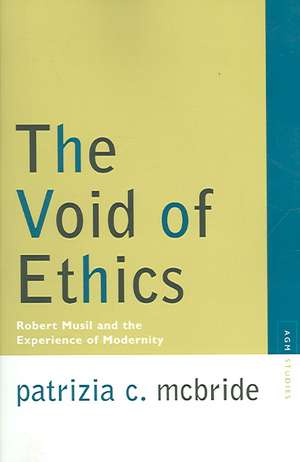The Void of Ethics: Robert Musil and the Experience of Modernity: Avant-Garde & Modernism Studies
Autor Patrizia McBrideen Limba Engleză Paperback – 22 apr 2006
In a pluralistic society without absolute standards of judgment, how can an individual live a moral life? This is the question Robert Musil (1880-1942), an Austrian-born engineer and mathematician turned writer, asked in essays, plays, and fiction that grapple with the moral ambivalence of modern life. Though unfinished, his monumental novel of Vienna in the febrile days before World War I, The Man without Qualities, is identified by German scholars as the most important literary work of the twentieth century.
In a fresh examination of his essays, notebooks, and fiction, Patrizia McBride reconstructs Musil's understanding of ethics as a realm of experience that eludes language and thought. After situating Musil's work within its contemporary cultural-philosophical horizon, as well as the historical background of rising National Socialism, McBride shows how the writer's notion of ethics as a void can be understood as a coherent and innovative response to the crises haunting Europe after World War I. She explores how Musil rejected the outdated, rationalistic morality of humanism, while simultaneously critiquing the irrationalism of contemporary art movements, including symbolism, impressionism, and expressionism. Her work reveals Musil's remarkable relevance today-particularly those aspects of his thought that made him unfashionable in his own time: a commitment to fighting ethical fundamentalism and a literary imagination that validates the pluralistic character of modern life.
In a fresh examination of his essays, notebooks, and fiction, Patrizia McBride reconstructs Musil's understanding of ethics as a realm of experience that eludes language and thought. After situating Musil's work within its contemporary cultural-philosophical horizon, as well as the historical background of rising National Socialism, McBride shows how the writer's notion of ethics as a void can be understood as a coherent and innovative response to the crises haunting Europe after World War I. She explores how Musil rejected the outdated, rationalistic morality of humanism, while simultaneously critiquing the irrationalism of contemporary art movements, including symbolism, impressionism, and expressionism. Her work reveals Musil's remarkable relevance today-particularly those aspects of his thought that made him unfashionable in his own time: a commitment to fighting ethical fundamentalism and a literary imagination that validates the pluralistic character of modern life.
Din seria Avant-Garde & Modernism Studies
-
 Preț: 289.42 lei
Preț: 289.42 lei - 13%
 Preț: 150.10 lei
Preț: 150.10 lei - 13%
 Preț: 267.20 lei
Preț: 267.20 lei - 10%
 Preț: 231.98 lei
Preț: 231.98 lei - 14%
 Preț: 184.36 lei
Preț: 184.36 lei - 20%
 Preț: 418.03 lei
Preț: 418.03 lei - 12%
 Preț: 270.33 lei
Preț: 270.33 lei - 12%
 Preț: 272.91 lei
Preț: 272.91 lei - 13%
 Preț: 188.19 lei
Preț: 188.19 lei - 11%
 Preț: 212.60 lei
Preț: 212.60 lei - 11%
 Preț: 230.32 lei
Preț: 230.32 lei -
 Preț: 181.49 lei
Preț: 181.49 lei -
 Preț: 199.45 lei
Preț: 199.45 lei - 20%
 Preț: 414.06 lei
Preț: 414.06 lei - 23%
 Preț: 593.26 lei
Preț: 593.26 lei - 13%
 Preț: 267.11 lei
Preț: 267.11 lei - 11%
 Preț: 230.50 lei
Preț: 230.50 lei -
 Preț: 147.87 lei
Preț: 147.87 lei
Preț: 202.50 lei
Preț vechi: 232.44 lei
-13% Nou
Puncte Express: 304
Preț estimativ în valută:
38.75€ • 40.56$ • 32.25£
38.75€ • 40.56$ • 32.25£
Carte indisponibilă temporar
Doresc să fiu notificat când acest titlu va fi disponibil:
Se trimite...
Preluare comenzi: 021 569.72.76
Specificații
ISBN-13: 9780810121096
ISBN-10: 0810121093
Pagini: 248
Dimensiuni: 152 x 229 x 23 mm
Greutate: 0.37 kg
Ediția:1
Editura: Northwestern University Press
Colecția Northwestern University Press
Seria Avant-Garde & Modernism Studies
ISBN-10: 0810121093
Pagini: 248
Dimensiuni: 152 x 229 x 23 mm
Greutate: 0.37 kg
Ediția:1
Editura: Northwestern University Press
Colecția Northwestern University Press
Seria Avant-Garde & Modernism Studies
Notă biografică
PATRIZIA C. McBRIDE is associate professor of German in the Department of German, Scandinavian and Dutch at the University of Minnesota.
Cuprins
Introduction: An Unfashionable Modernist
Chapter 1. Törless and the Delusions of Sensuality
Chapter 2. The Mathematical Man, or the Advantages of Scientific Precision
Chapter 3. World War I and the Troubles of a "Time Devoid of Ordering Concepts"
Chapter 4. Kant and the Ethics of Aesthetic Judgment
Chapter 5. Staging the Failure of an Aesthetic Utopia: The Man without Qualities
Postscript: "How Should One Live?" Fragments of an Inductive Ethics
Chapter 1. Törless and the Delusions of Sensuality
Chapter 2. The Mathematical Man, or the Advantages of Scientific Precision
Chapter 3. World War I and the Troubles of a "Time Devoid of Ordering Concepts"
Chapter 4. Kant and the Ethics of Aesthetic Judgment
Chapter 5. Staging the Failure of an Aesthetic Utopia: The Man without Qualities
Postscript: "How Should One Live?" Fragments of an Inductive Ethics
Descriere
In a pluralistic society without absolute standards of judgment, how can an individual live a moral life? This is the question Robert Musil (1880-1942), an Austrian-born engineer and mathematician turned writer, asked in essays, plays, and fiction that grapple with the moral ambivalence of modern life. Though unfinished, his monumental novel of Vienna in the febrile days before World War I, The Man without Qualities, is identified by German scholars as the most important literary work of the twentieth century.
